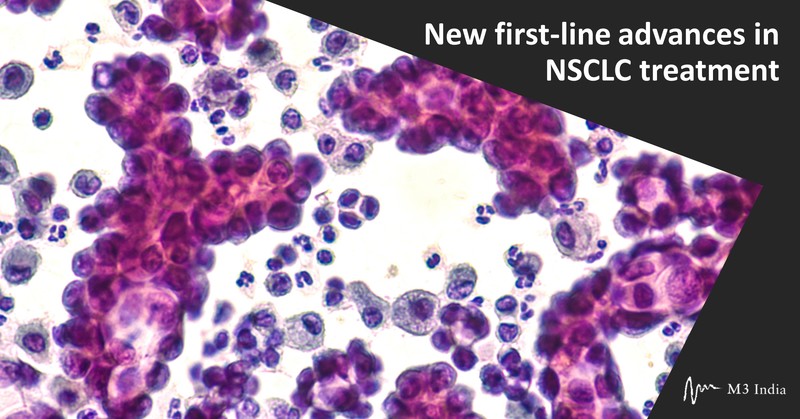New first-line advances in NSCLC treatment
M3 Global Newsdesk Feb 11, 2020
Metastatic non-small cell lung cancer (NSCLC) severely impacts patient quality of life secondary to considerable symptom burden. The FDA recently made two moves to help combat this disease through the approval of new first-line treatments for affected patients without EGFR or ALK mutations.

In early December 2019, the agency approved atezolizumab (Tecentriq) in combination with chemotherapy (paclitaxel protein-bound [Abraxane] and carboplatin) for the initial treatment of adults with metastatic NSCLC.
In mid-January 2020, the FDA granted priority review to Bristol-Myers Squibb’s application for its combination of nivolumab (Opdivo) and ipilimumab (Yervoy) for the treatment of metastatic or recurrent NSCLC.
Atezolizumab plus chemotherapy
Genentech’s atezolizumab is a monoclonal antibody that targets programmed cell death ligand 1 (PD-L1). The drug is indicated for the initial treatment of adult patients with metastatic NSCLC with disease progression following platinum-containing chemotherapy.
The FDA’s approval of atezolizumab plus chemotherapy was based on results from the phase 3 IMpower130 study. This randomised, open-label trial involved chemotherapy-naïve adult patients with stage IV non-squamous NSCLC; this group included patients who may have been administered prior treatment with EGFR or ALK kinase inhibitors. Of the 724 enrolled participants, 681 were included in the intention-to-treat wild-type (ITT-WT) population. These participants were randomised (2:1) to receive either atezolizumab plus chemotherapy (experimental) or chemotherapy alone (control).
The co-primary endpoints were progression-free survival (PFS) in the participants without EGFR or ALK mutations (the ITT-WT group) and overall survival (OS) in the ITT-WT group.
Results showed that PFS was 7.2 months (95% CI: 6.7-8.3) in the experimental group vs 6.5 months (95% CI: 5.6-7.4) in the control group (HR: 0.75; 95% CI: 0.63-0.91; P = 0.0024). Median OS was 18.6 months (95% CI: 15.7-21.1) in the experimental group vs 13.9 months (95% CI: 12.0-18.7) in the control group (HR: 0.80; 95% CI: 0.64-0.99; P = 0.0384).
Median follow-up was about 19 months in both groups. Common side effects in patients receiving atezolizumab plus chemotherapy included fatigue/asthenia, nausea, alopecia, diarrhea, and decreased appetite. In total, there were eight treatment-related deaths in the experimental group and one death in the control group.
Trial researchers, who published their results in The Lancet Oncology, wrote:
“IMpower130 shows that the addition of atezolizumab to carboplatin plus nab-paclitaxel demonstrated a significant and clinically meaningful improvement in overall survival and a significant improvement in progression-free survival, with an acceptable safety profile, in chemotherapy-naive patients with stage IV non-squamous non-small-cell lung cancer with EGFRwt [wild type] and ALKwt [wild-type] tumours, providing another treatment option for patients."
Nivolumab plus ipilimumab
The FDA’s acceptance of the supplemental Biologics License Application for nivolumab plus ipilimumab for the first-line treatment of patients with metastatic or recurrent NSCLC without EGFR or ALK mutations is based on Part 1 results from the CheckMate-227 trial. This multi-part, open-label, phase 3 trial examined nivolumab regimens compared with platinum-doublet chemotherapy in patients with advanced non-squamous and squamous NSCLCs.
In Part 1a of the trial, researchers compared either nivolumab combined with low-dose ipilimumab or nivolumab alone with chemotherapy in patients with PD-L1–positive tumors. In Part 1b, they compared either nivolumab plus low-dose ipilimumab or nivolumab plus chemotherapy with chemotherapy alone in patients with PD-L1–negative tumors.
In their appraisal of the results, the FDA noted the following:
“Part 1 met both its co-primary endpoints of PFS with the Opdivo plus Yervoy combination versus chemotherapy in patients whose tumors have high (≥ 10 mutations/megabase, mut/mb) [tumor mutational burden], regardless of PD-L1 expression, and OS demonstrating a superior benefit for Opdivo plus low-dose Yervoy versus chemotherapy in first-line NSCLC patients whose tumors express PD-L1 ≥1%.”
However, the agency also noted that Part 2 failed to attain its primary endpoint for OS for nivolumab plus chemotherapy vs chemotherapy alone in those with non-squamous NSCLC, regardless of PD-L1 status.
The study investigators, who published their results in The New England Journal of Medicine, observed no new safety concerns in the study.
“The FDA’s acceptance of our application for Opdivo plus Yervoy represents an important milestone for patients with lung cancer in the United States, where, despite recent treatment advances, lung cancer remains the cause of more than 150,000 deaths each year,” said Sabine Maier, MD, a Bristol-Myers Squibb representative.
“Lung cancer is the third tumor type where the combination of Opdivo and Yervoy has demonstrated significant long-term overall survival benefit in a randomised Phase 3 trial, which further validates the immunologic rationale for dual Immuno-Oncology therapy.”
This story is contributed by Naveed Saleh and is a part of our Global Content Initiative, where we feature selected stories from our Global network which we believe would be most useful and informative to our doctor members.
-
Exclusive Write-ups & Webinars by KOLs
-
Daily Quiz by specialty
-
Paid Market Research Surveys
-
Case discussions, News & Journals' summaries